Dec. 10 was the International Day of Human Rights and according to the United Nations, this year marked 75 years since the Universal Declaration of Human Rights was adopted by the U.N. According to human activist organization Amnesty International, due to some restrictive public policies in the United States, the topic of human rights has been more and more prevalent with issues such as racism, homophobia and abortion at the forefront of household conversations. The main contributor to the debate of what is considered a human right is the recent overturning of Roe v. Wade as well as violence against marginalized groups such as Native and Black Americans stated Amnesty International.
According to WTHR13, Indianapolis is no stranger to seeing people speak out against human rights violations, as in 2021 members of the local Burmese community gathered at Monument Circle downtown in order to protest against the military coup taking place in Myanmar (previously known as Burma). The Burmese American Community Institute is a non-profit organization serving those that are a part of the Burmese community in the Indianapolis area, which has the largest population of Burmese people in the U.S., as stated on the BACI website. BACI states the group is dedicated to helping Burmese immigrants receive education and employment. According to UIndy Professor of History and Political Science Milind Thakar, there are several issues regarding human rights throughout the world that international students have to think about while attending school in the United States.
“There are those that target racial minorities, ethnic minorities, minorities by class, by gender and in many countries around the world in developing countries if you’re not heterosexual, that is considered a crime,” Thakar said. “All of those are ways in which human rights are being violated.”
According to Thakar, international students may take ideas of what human rights should include from the United States and bring them back to their home countries, as well as taking ideas from their countries and bringing them back to the U.S. UIndy Director of International Services Marilyn Chase said these policies in both the U.S. and in international students’ home countries affect students in more than one way.
“It’s like a double-whammy for international students. You have to think about what’s going on at home, what things are changing with regard to what rights you may have,” Chase said. “And, then you are, of course, subject to the legal policies of the country that you’re visiting. So you do have to be doubly careful.”
Thakar said people should care about Human Rights Day because even though progress is being made across the globe, there are often rollbacks seen in policies, like people are seeing in the U.S. with the overturning of Roe v. Wade. According to Chase, whenever people see rights like this being stripped or denied from people, the best thing people can do is listen to those who are affected and be present.
“Sometimes we’re wanting to find a solution and sometimes there is no immediate solution to a problem. So, the first thing we all need when we have something that we’re struggling with is someone who will at least listen to us,” Chase said. “…Perhaps guidance toward those resources that might be available that could help you with what it is that you need. Human Resources, people who might know better how to help you. You don’t have to be an expert in anything to help someone who’s struggling with this, you just need to be able to listen.”

Thakar said that there are a variety of resources available for students to learn about human rights issues as well as donate to charities in support of those affected. Exodus Refugee Immigration is a local organization based in Indianapolis and was founded in 1981, according to Exodus’ website. The organization serves refugees from over 50 different countries, who are displaced by injustice and helps them start new lives in Indiana, according to their website.
“Ideally, in a world where all people are granted basic human rights, where the world would agree on what those rights are, and work together to ensure that we have them, I just see a better world where we have agreed on something that we feel is so vital to our existence, and we’re willing to work together to accomplish it,” Chase said. “That’s almost a dream, and I would love to see that.”







